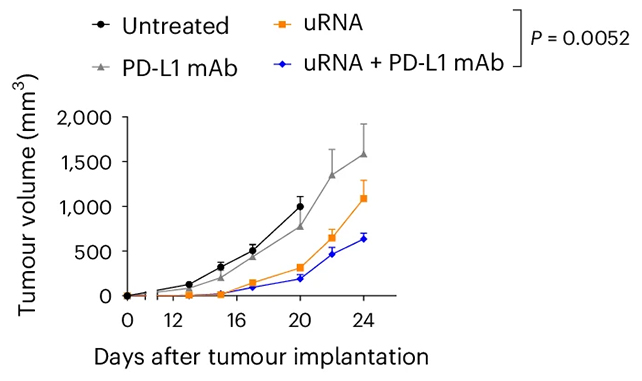Scientists are making encouraging progress in developing vaccines to treat cancer, but so far the therapies have been restricted to specific types of tumor. Now new research points the way to a universal vaccine that could attack a wider range of cancers.
The research led by a team at the University of Florida focuses on "waking up" the immune system to better respond to more types of cancerous cell – tumors that would otherwise be missed for a variety of reasons.
"What we found is by using a vaccine designed not to target cancer specifically but rather to stimulate a strong immunologic response, we could elicit a very strong anti-cancer reaction," says neuroscientist Duane Mitchell.
Related: Your Tea's Temperature Could Put You at Risk of Some Cancers
"And so this has significant potential to be broadly used across cancer patients – even possibly leading us to an off-the-shelf cancer vaccine."
The vaccine itself uses mRNA to produce signaling proteins known to elicit a pronounced immune response, effectively mobilizing the immune system in a way that makes cancerous tissues more sensitive to attack.
Crucially, the materials created by the vaccine's mRNA weren't specific to the cancer tumors that were treated, but rather enhanced a reaction from dormant cells that weren't typically associated with a cancer response. It's like a one-size-fits-all siren for our body's border patrol – and that suggests it could have broad application potential.

A second component to the treatment uses common anti-cancer drugs called immune checkpoint inhibitors (ICIs). These essentially remove some of the brakes on the immune system, making it even more effective.
While ICIs have been successfully used against cancers in the past, tumors with numerous mutations can develop resistance to their attack.
When both the vaccine and the ICIs were used together on mice with tumors, the researchers saw a strong tumor-fighting response, even against cancerous growths that are normally resistant to treatments. Some tumors were eliminated entirely in the tests.
Though the vaccine worked effectively on its own in certain scenarios, the best results were seen in combination with ICIs. The combined therapy still needs to be tested in people in clinical trials to determine its effectiveness and safety, but the preclinical results suggest the approach is worth exploring further.
"This finding is a proof of concept that these vaccines potentially could be commercialized as universal cancer vaccines to sensitize the immune system against a patient's individual tumor," says oncologist Elias Sayour.
The team is already busy working on new formulations of their mRNA vaccine, and clinical trials are planned. This also needs to be tested in a wider range of scenarios – preventing cancer from coming back, for example, as well as treating it when it's recently been found.
There might also be ways to recognize patients who would be more likely to benefit from this type of vaccine than others. Researchers are tackling the challenge of fighting cancer from multiple different angles, and we're probably going to need all of them.
Whenever tweaking the immune system is involved, there's always the danger of side effects and responses that eventually harm rather than help the body – but from the results so far, this new vaccine approach seems to be a promising one.
"It could potentially be a universal way of waking up a patient's own immune response to cancer," says Mitchell.
"And that would be profound if generalizable to human studies."
The research has been published in Nature Biomedical Engineering.
